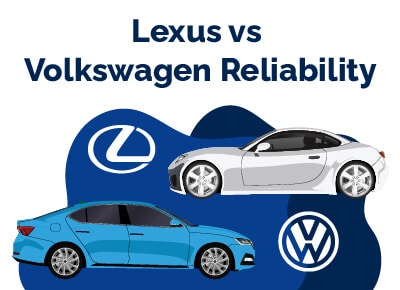Lexus vs Volkswagen: Reliability Comparison
June 23, 2023


Chris is Head of Content for FindTheBestCarPrice and is based out of Philadelphia, PA. As a seasoned automotive industry analyst and car enthusiast, he ensures the highest level of quality across all our content and curates our picks for the best deals each month.
Chris studied information systems and marketing at Drexel University and writes about a wide range of topics ranging from car buying tips to troubleshooting common mechanical issues.
When he’s not thinking about cars, he likes to stay in with his dog and make an “attempt” to finish a crossword puzzle (he’s not quite at the Saturday/Sunday level…yet). As a former cheesemonger, Chris still has a “sharp” passion for all things cheese, and his fridge is always loaded with it!
Chris also has a passion for things that go fast, and drones are no exception. He spends some of his time writing for Dronesourced.
Lexus, as a brand, merges the Latin term "Luxus" and the French term "luxe" to convey grace and abundance, in addition to the Greek term "lexicon," signifying language.
Conversely, the moniker "Volkswagen" is an amalgamation of two German words: "Volks," representing people, and "Wagen," meaning car, resulting in the phrase "People's Car" or "Car for the People."
Volkswagen garners acknowledgment for its innovation-focused culture and unwavering dedication to quality, customer contentment, and sustainability.
On the other hand, Lexus establishes that technology-driven luxury vehicles can also be exceedingly dependable, claiming the second spot in a recent annual auto reliability brand ratings by Consumer Reports.
The interiors are mainly polished, the engines run smoothly with ample power, and the hybrid models exhibit remarkable fuel efficiency.
This article will compare Lexus vs. Volkswagen reliability to enable you to decide which of them is better for you!
Table of Contents
- Lexus vs. Volkswagen Reliability: Detailed Comparisons
- Which Is the Best Car: Lexus or Volkswagen?
- 1. Lexus vs. Volkswagen Reliability: Design
- 2. Lexus vs. Volkswagen Reliability: Repair and Maintenance Cost
- 3. Lexus vs. Volkswagen Reliability: Durability
- 4. Lexus vs. Volkswagen Reliability: Engine
- 5. Lexus vs. Volkswagen Reliability: Gas Mileage
- 6. Lexus vs. Volkswagen Reliability: Technology
- 7. Lexus vs. Volkswagen Reliability: Safety
- Final Verdict
- Best Car Deals by Category
Lexus vs. Volkswagen Reliability: Detailed Comparisons
| Features | Lexus | Volkswagen |
| Design | ||
| Repairs and Maintenance Cost | ||
| Durability | ||
| Engine | ||
| Gas Mileage | ||
| Technology | ||
| Safety |
Which Is the Best Car: Lexus or Volkswagen?
The question of which car brand reigns supreme between Lexus and Volkswagen has been a subject of spirited discussion amongst automobile enthusiasts.
Both automobile manufacturers have established singular identities, with Lexus receiving recognition for its emphasis on luxury, while Volkswagen has forged a reputation through its devotion to originality and customer gratification.
Reliability is a significant factor to consider when evaluating the merits of these two car brands. Available data suggest that Lexus may have the edge over Volkswagen regarding reliability.
Lexus boasts a reliability rating breakdown of 4.0 out of 5.0, placing it among the top-ranking performers among all car brands. While still demonstrating commendable reliability with a 3.5 rating out of 5.0, Volkswagen falls marginally behind in this aspect.
However, the choice between Lexus and Volkswagen goes beyond reliability. Lexus has built a reputation for unmatched comfort, luxurious interiors, and cutting-edge technological features.
On the other hand, Volkswagen is renowned for its ingenious engineering and unwavering commitment to sustainability and quality.
Concerning performance, Lexus vehicles are often lauded for their smooth rides, robust engines, and remarkable fuel efficiency, particularly in their hybrid models.
In contrast, Volkswagen automobiles are celebrated for their agile handling, impressive acceleration, and high-performing turbocharged engines.
Choosing between Lexus and Volkswagen, for the most part, depends on individual preferences, needs, and priorities.
1. Lexus vs. Volkswagen Reliability: Design
L-finesse is a term used to describe the design language of Lexus since 2003. It encompasses a more profound design philosophy emphasizing leading-edge design and technology applied with finesse.
The concept of finesse is rooted in Japanese hospitality and aesthetics and has evolved into a dynamic and evolving concept. L-finesse design can be broken down into three core principles: Seamless Anticipation, Incisive Simplicity, and Intriguing Elegance.
Seamless Anticipation focuses on anticipating and delivering on the customer's needs and desires, while Incisive Simplicity seeks to reduce complexity and reveal the purity of purpose and expression.
Intriguing Elegance emphasizes capturing and holding the customer's attention with elegant bodywork, dynamic changes of pace, and bold visual expressions.
On the other hand, Volkswagen's success as a top-tier automaker is attributed to its culture of innovation, quality, customer satisfaction, and sustainability.
The brand's new design reflects its fresh attitude, which is human, open, inviting, transparent, responsible, and authentic. The updated brand design aims to highlight the differences between Volkswagen and its competitors and make them more perceptible.
Both companies have unique design philosophies and principles that contribute to their success. Still, the winner, in this case, would be L-finesse for its depth of thinking and emphasis on hospitality and aesthetics.
Winner: Lexus
2. Lexus vs. Volkswagen Reliability: Repair and Maintenance Cost
Lexus vehicles are renowned for their reliability and affordability. In fact, during the first decade of service, Lexus models require an average of only $7,786 for maintenance and repairs.
This impressive figure sets Lexus apart from other luxury brands, with an industry-beating margin of $4,258.
On the other hand, Volkswagen automobiles come with higher costs, averaging about $8,166 for maintenance and repairs during their initial ten years of operation.
This places Volkswagen's maintenance and repair costs above the popular brand industry average by $1,352.
Winner: Lexus
3. Lexus vs. Volkswagen Reliability: Durability
Lexuses have impressive longevity, with a projected lifespan of 250,000 to 300,000 miles.
This exceeds the average car on the road, expected to last approximately 200,000 miles. This represents an extension of 50% in comparison to most cars.
Conversely, a Volkswagen that has been adequately maintained can traverse at least 200,000 miles, with several models exceeding this threshold. Volkswagen's prestige as a German automaker is reflected in its renowned excellence and durability.
The Volkswagen Golf, in particular, has gained a reputation as one of the most trustworthy models available, providing occupants with luxury, convenience, and enduring dependability.
Winner: Lexus
4. Lexus vs. Volkswagen Reliability: Engine
Since its inception in 1989, Lexus has earned a reputation for producing luxurious automobiles with smooth and commanding V8 engines.
Among the brand's most powerful engines, the Lexus 2UR-GSE resides in the front of the Lexus LC 500 coupe and convertible, unleashing 471 horsepower and 398 lb-ft of torque.
Meanwhile, the 2022 Lexus LS 500 boasts a sophisticated twin-turbo V6 engine that accelerates briskly.
Volkswagen's TSI engine, an acronym for turbocharged stratified injection engine, is a cutting-edge technology utilizing stratified charge engines for gasoline engines.
This compact TSI engine incorporates the most advanced FSI and TDI technologies, improving performance and fuel efficiency.
In contrast, the EA888 engine family comprises three and four-cylinder engines deployed throughout the Volkswagen Group, representing an evolutionary leap from the earlier EA827/113 units designed to deliver exceptional performance.
Winner: Lexus
5. Lexus vs. Volkswagen Reliability: Gas Mileage
The 2022 Lexus ES Hybrid, with its fuel economy of up to 43 mpg city and 44 mpg highway, reigns supreme among Lexus models. The Lexus IS 300 delivers 21 City, 31 Highway MPG (FWD) and 19 City, 26 Highway MPG (AWD).
However, among the 2022 Volkswagen models, the 2022 Volkswagen Jetta takes the lead with an impressive 43 mpg on the highway. Furthermore, the 2022 Taos is the most fuel-efficient Volkswagen SUV, offering up to 37 mpg on the highway.
Additionally, the 2019 Volkswagen Passat achieves an exceptional fuel efficiency of up to 36 mpg on the highway while boasting a stylish design.
Winner: Volkswagen
6. Lexus vs. Volkswagen Reliability: Technology
Lexus prides itself on its groundbreaking innovations, embracing big ideas and unconventional approaches to drive unparalleled advancements in the automotive industry.
Focusing on pushing the limits, they have introduced industry-first features, such as the driver attention monitor, pedestrian detection system, and advanced parking guidance system.
Their climate-control system results from extensive research into everything from thermodynamic properties to the brain's interpretation of temperature. Even with these accomplishments, Lexus continues to innovate, and the possibilities are endless.
On the other hand, Volkswagen has developed the VW Car-Net, a suite of software applications designed to integrate smartphones and vehicles seamlessly.
VW Car-Net App-Connect allows drivers to select and use specific smartphone apps directly from the vehicle's dashboard, including maps, music, messaging, and more.
The Guide & Inform feature also offers satellite navigation, traffic updates, and weather reports linked with SiriusXM Traffic and Travel Link. In contrast, the Security & Service feature provides:
- Essential functionalities like locating your vehicle.
- Checking for locked doors.
- Receiving vehicle health reports.
- Calling for emergency assistance.
With its ability to integrate with popular connected car technologies such as Android Auto, Apple CarPlay, and MirrorLink, VW Car-Net App-Connect provides drivers with familiar interfaces and easy connectivity.
Winner: Both
7. Lexus vs. Volkswagen Reliability: Safety
In the quest for an accident-free world, Lexus takes another step forward by introducing Lexus Safety System+ 3.0* in their 2022 NX and 2023 RX models. This advanced safety system is the most sophisticated standard in a Lexus and previews what's to come.
With the ability to detect motorcycles, oncoming traffic, and upcoming curves, Lexus Safety System+ 3.0* is designed to alert the driver and assist in certain circumstances.
Furthermore, it was recognized as the Top Safety Pick+ by the Insurance Institute for Highway Safety (IIHS) in 2022.
Meanwhile, Volkswagen's IQ.DRIVE suite provides standard safety features such as adaptive cruise control, active blind spot monitor, rear traffic alert, front assist, emergency assist, and lane assist.
These features utilize sensors, cameras, and automated systems to maximize safety on the road.
Winner: Lexus
Final Verdict
Lexus outperformed Volkswagen in most of the reliability assessments, indicating that Lexus is more reliable than Volkswagen.
This is not intended to criticize the Volkswagen brand in any way; it is simply a fact that Lexus is more reliable.
Best Car Deals by Category
Posted in Car Buying Tips, Car Troubleshooting |




